Millennials and Organized Religion: How Your Church Can Reach Millennials in 2024

"Millennials Are Leaving Organized Religion." How many times have you seen that headline (or something similar) over the past decade and a half? A river of ink has been spilled with concern over Millennials' religious beliefs.
Millennials used to be the least Christian, most unbelieving generation in American history...until they were dethroned by their Gen Z successors. Though they no longer hold that title, they are still a majority unbelieving generation. Sharing Christ with them and bringing them into the church is paramount.
Let's talk about where Millennials are in their faith, why there is reason to hope, and what your church can do to reach Millennials for the Gospel now and beyond.
Who Is the Millennial Generation?
Sociologists differ on where this generation begins and ends, but for this post, we will say that Millennials were those born between 1980 and 1996. This generation followed Gen X (born 1965-1979) and preceded Gen Z (born between 1997 and early 2010s). Millennials today are as young as 27 and as old as 43. They get their name from the fact that they came of age as we entered the new millennium.
What Distinguishes Millennials From Previous Generations?
The defining factor that distinguishes Millennials from preceding and succeeding generations is the occurrence of 9/11. This generation was old enough to understand the significance of the moment yet young enough for it to be a truly formative experience.
But that's not all that distinguishes this generation from others. Millennials grew up during the tech boom, meaning they grew up in a home with a family computer and a big screen tv and later got their hands on the first mp3 players and smartphones. They also witnessed the social media explosion, coming of age just as Facebook and Twitter came into the scene.

However, despite being very comfortable with modern technology, Millennials have kept their relationship with tech at arm's length. Unlike Gen Z, who have been immersed in smartphones, apps, and social media from a very early age, this generation's childhood wasn't dominated by technology. They were able to disconnect, go outside, and live a life that wasn't mediated by a screen.
Millennials also entered adulthood and the job market just as the economy crashed, leaving them with very few prospects. This delayed them from engaging in many rites of adulthood, like leaving their parents, getting married, having kids, and buying a house. This generation has reached those milestones much later than their elders did.
Millennial Religious Affiliation
Barna released a study last year regarding church attendance trends before, during, and after the pandemic to see how attendance trends have changed. I was really surprised by what their poll results uncovered. Also, the Cooperative Election Study of Harvard University just released their survey results of how each generation identifies themselves regarding religious affiliation. Both of these studies together give us a full view of the dramatic changes in the nation's religious affiliations.
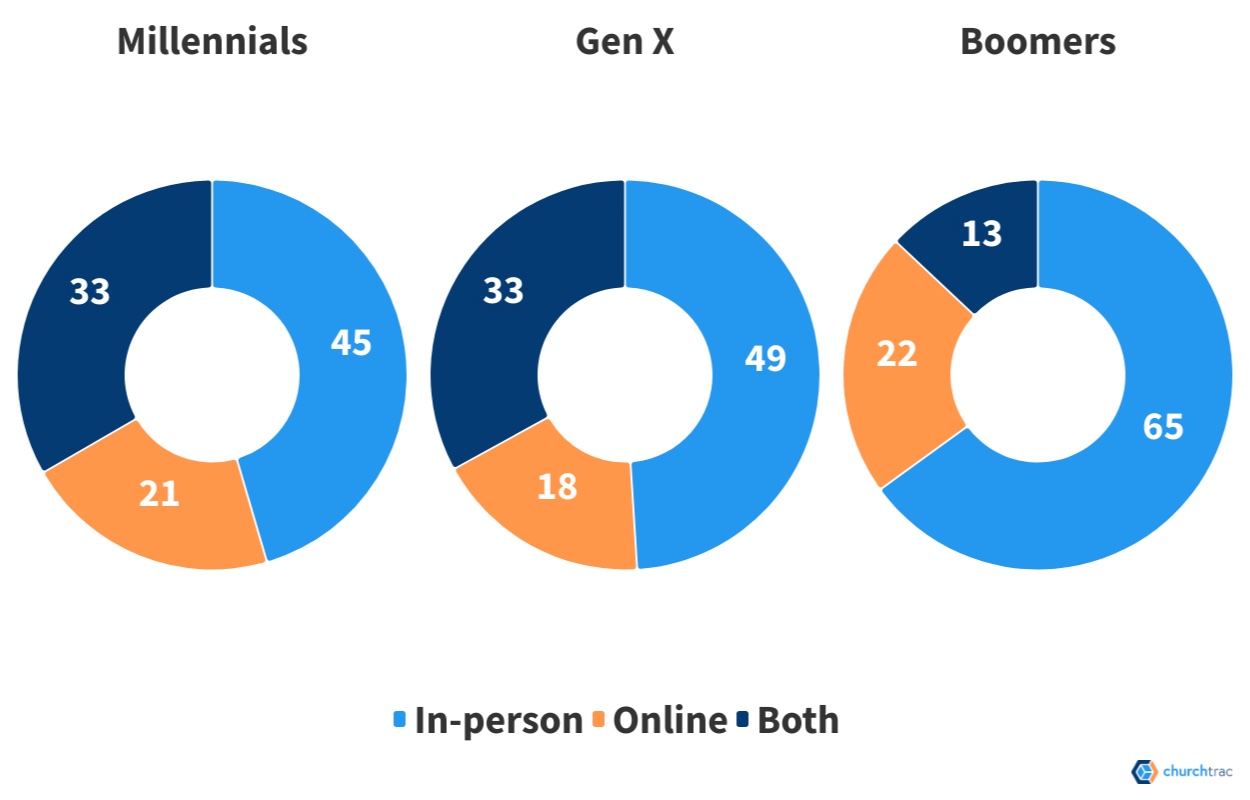
Barna found that Millennials have embraced using technology to connect with the church more than any other generation. 55% of Millennials reported attending church either exclusively online or both online and in-person. Compared to only 35% of Baby Boomers who say the same, that means this generation has no problem looking to technology to engage in worship.
However, less than half of Millennials believe God exists or profess any faith at all. Millennial Christians are a minority within their own generation.
Millennials and the Broader Religious Landscape
Millennials used to be the least-churched generation in American history. That has changed. Not because Millennials turned to church in droves, but because Gen Z came to church in even fewer numbers.
However, Millennials are still largely not attending church. The majority have either never been to church or have walked away over the past decade.
Pew Research Center found that 40% of young adults are religiously unaffiliated. The Cooperative Election Study of Harvard University found in their survey that 44% of Millennials self-identified as an atheist, agnostic, or "nothing in particular" compared to 42% self-identifying as Christian. More Millennials don't care or don't believe in God.
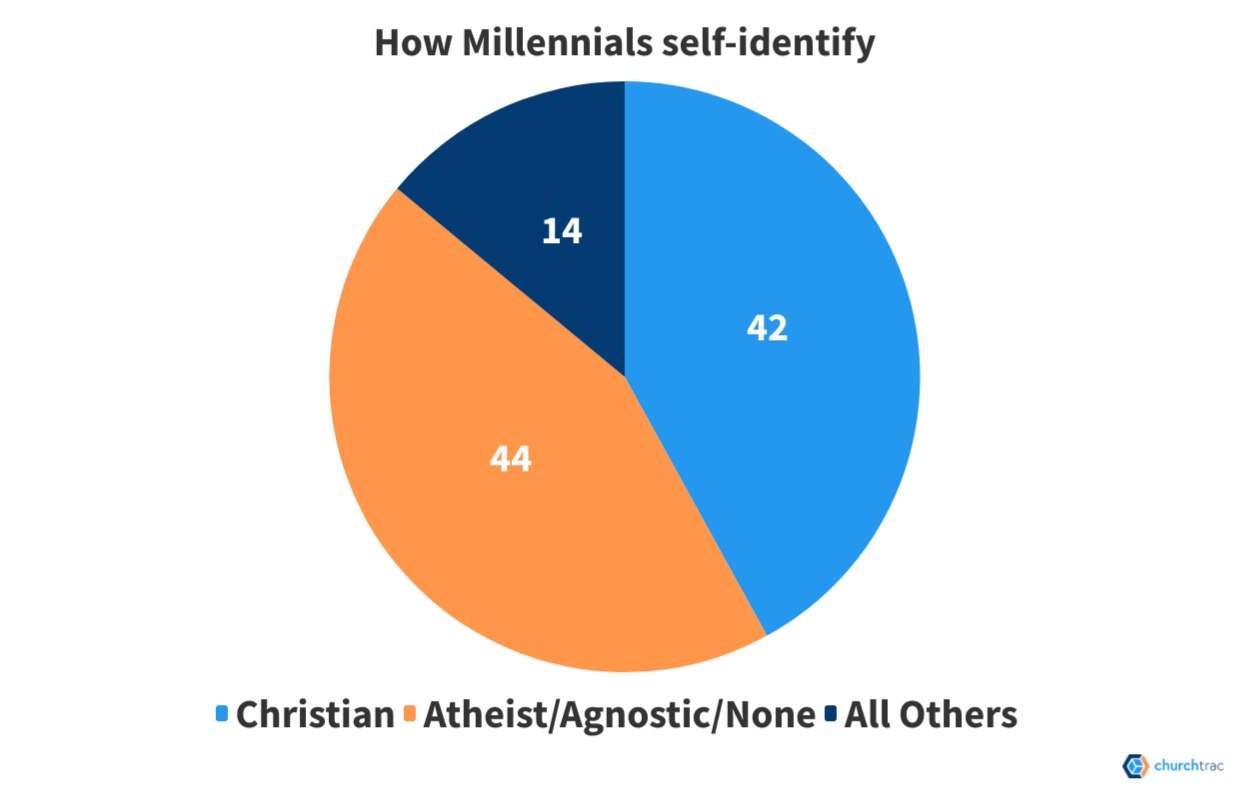
But there's a recent statistic that really surprised me...
The Percent of Millennials Attending Church is Growing
Millennials represent the most significant surge in church attendance since the end of the pandemic. In fact, according to Barna's survey, more Millennials attend church now than before the pandemic, reversing the decade-long trend of millennials leaving organized religion! More of this generation are attending churches regularly than either Boomers or Gen Xers!
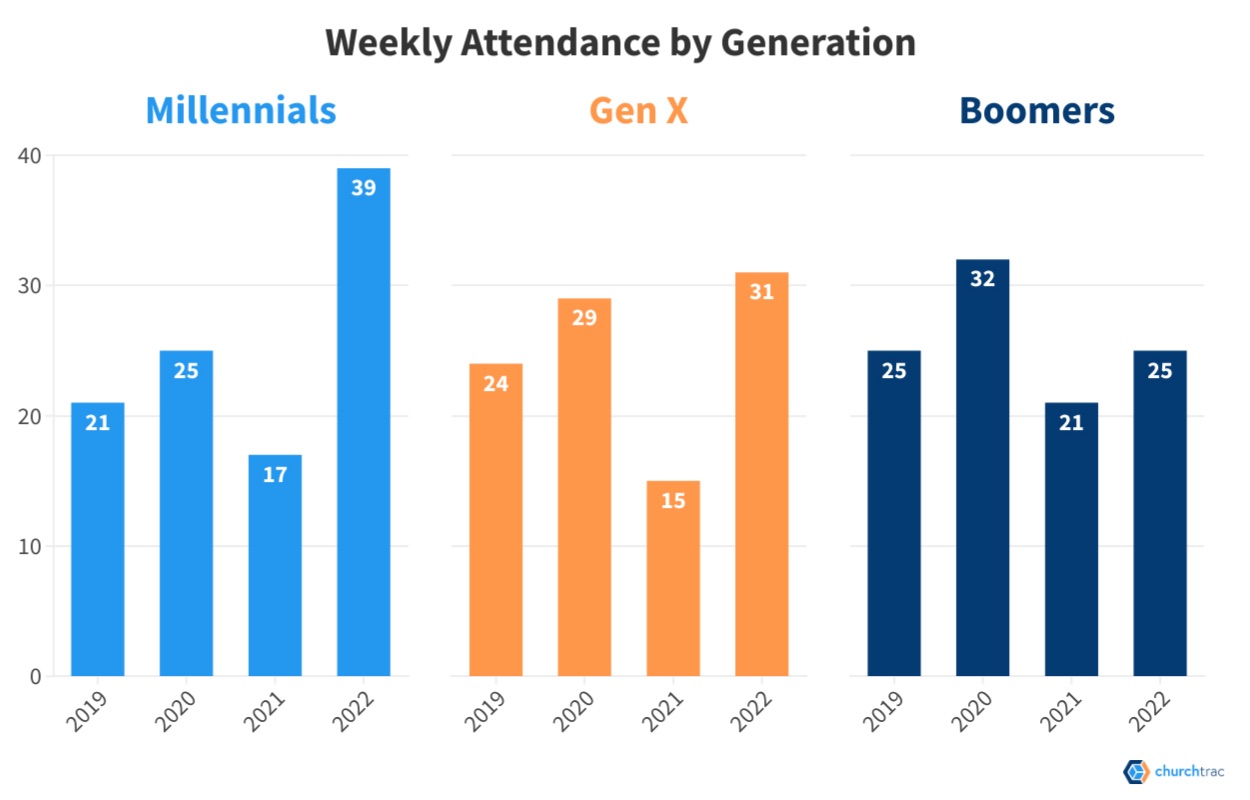
Millennial church attendance is growing against everyone's expectations. But it's important to keep in mind that Only 30% of Millennials report attending religious services at least once a month or more. So those that report attending church may be doing so infrequently.
How Churches Can Reach Millennials
Does your church have a heart for the Millennials in your community and want to reach them for the Gospel? Below are 5 ways your church can reach Millennials...
1. Be Authentic
Just like with Gen Z, the most important thing is to be authentic. Trying to be the coolest church with the best programs may draw people in at first, but Millennials (and others) will see through whatever masks you wear.
The best thing to do is for you and everyone else in your church to keep it real. The pressure is off. Millennials don't want or need you to perform. They're looking for connection and a place to ask questions or find guidance.
2. Service and Social Action
Millennials have always been passionate about social justice. Ethical Capitalism (sometimes called Conscious Capitalism) has been the preferred mode of economic engagement for young adults for the past several years, meaning Millennials want to buy from brands that value the same social causes they value.
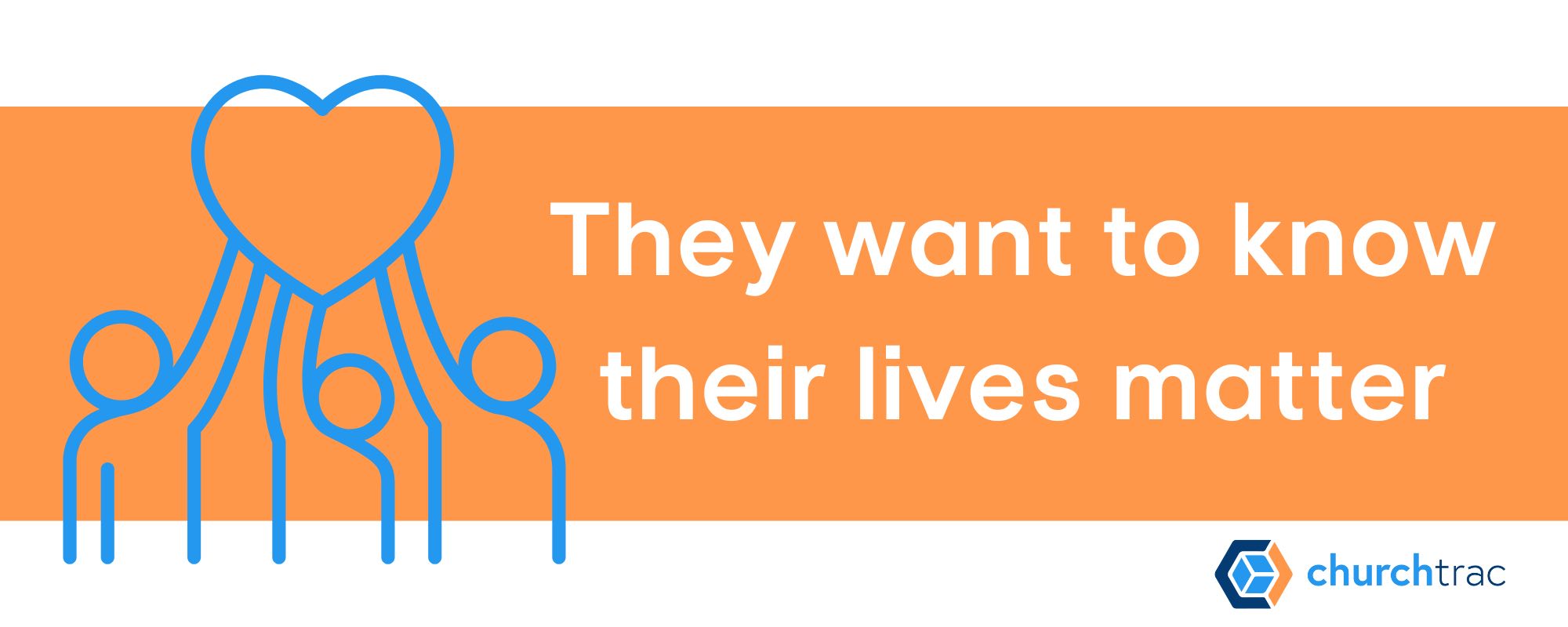
Millennials want to know that their lives matter and that they are contributing to making the world a better place. The best thing your church could do to plug Millennials in and keep them long-term is to connect them with any and all ministries you offer that make a positive difference in the lives of people in your community. If you have a homeless ministry, single mom's ministry, prison ministry, or anything similar, many Millennials will be drawn to those programs. Consider going so far as to ask them to lead or start one of those ministries at your church!
3. Relevant Sermons
Millennials are going through big life changes right now. They're getting married, having kids, buying homes, taking care of their aging parents, and worrying about the future. Many that are returning to church do so in search of answers to what they are facing.
Gallup's survey on church attendance found that the top two reasons people to go church are to hear sermons that 1) teach more about Scripture and 2) connect their faith to their personal lives. This is great news! The best thing you can do to reach Millennials is to do what you've always done best: Use the Gospel to speak directly into the lived experience of the people in your community.
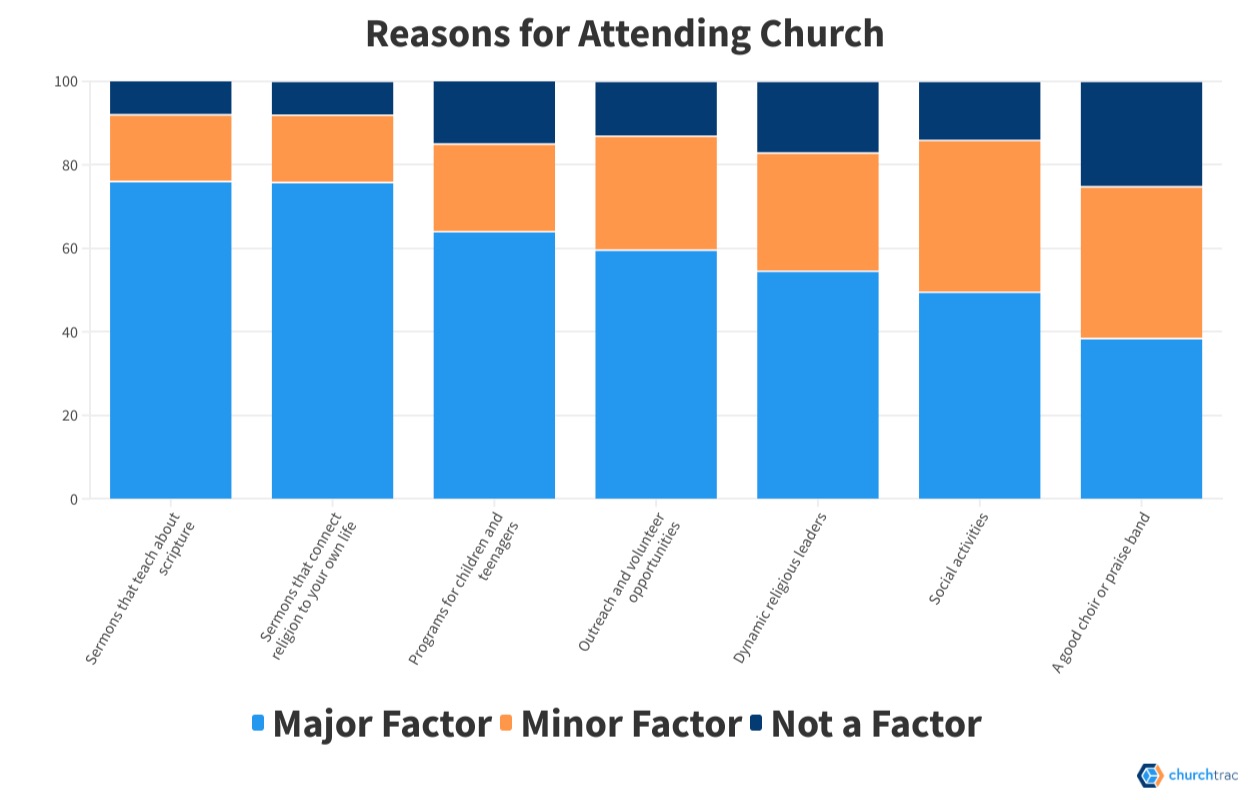
4. A Robust Children's Ministry Will Help
Programs aren't the answer to low church attendance. However, it must be noted that more and more Millennials are having kids every year. As this generation darkens the doors of churches across the country, many will be looking for a church that has something to offer their kids.
Millennials have more than just themselves to think about when it comes to church attendance. They have to consider what their children need as well. Investing in your children's ministry will go a long way in making them feel like they've found their spiritual home.
5. Consider Keeping Your Livestream
As Millennials have more kids, their weekends are filling up with sports and other obligations. This means they may get pulled away from the church Sunday morning for an out-of-town game or something similar.
More than any other generation, Millennials have embraced hybrid worship. They had no problem switching from in-person worship to online worship and are very comfortable watching your church's livestream on occasion instead of being in the building.
While you may have reason to stop livestreaming your service, it's worth considering that the livestream has helped keep the Millennial generation connected to the church through the ups and downs of the pandemic and other big life changes. Ending online worship could sever that connection for some.
Millennials, Faith, and Your Church
Your church can reach Millennials, but the time to do so is drawing short. As Millennials age, their lifelong habits will become more concrete. The longer we wait to reach them, the less likely they will be willing to hear the Gospel later.
Reaching Millennials isn't rocket science. By being authentic, teaching relevant sermons, and ministering to their whole family, your church can minister to the Millennial generation. Now is the time for your church to have a tremendous impact!

|
Matt
|